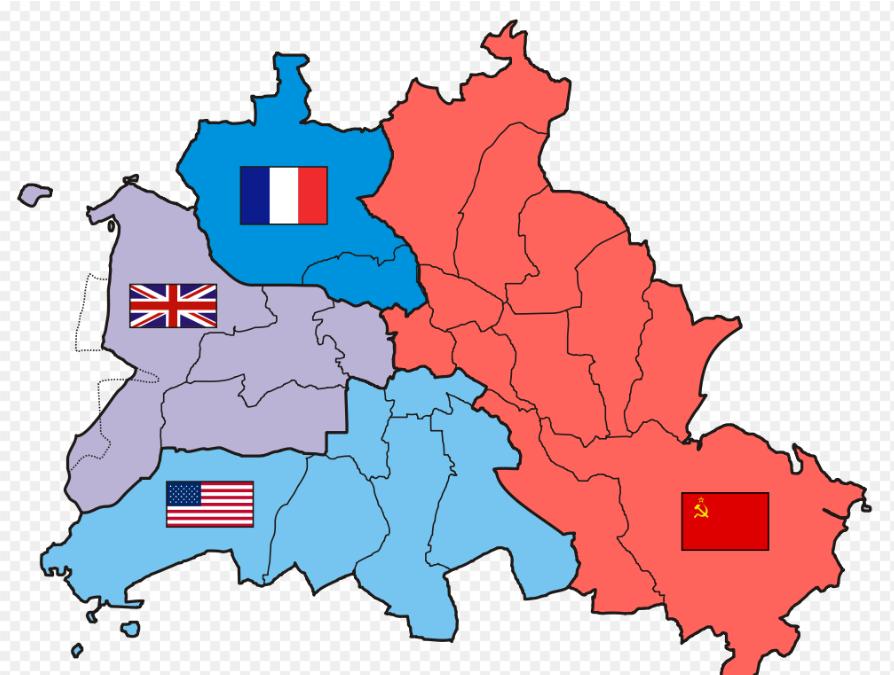After the end of World War II, the German capital Berlin was occupied by the United States, the Soviet Union, the United Kingdom, and the French divisions. Among them, the Anglo-American and French occupation zone was West Berlin, which was surrounded by East Germany and became an enclave of West Germany.
As the Iron Curtain fell, millions of East Germans fled from Soviet occupation to West Berlin, and even other Eastern Europeans saw Berlin as a shortcut to the West. Between 1949 and 1961, about 2.6 million East Germans fled to West Berlin, mostly well-educated engineers, doctors, lawyers, teachers, and skilled workers, which had a serious impact on the socio-economic situation of East Germany.

On August 13, 1961, in order to prevent more Germans from fleeing, but also to keep out the so-called Western spies. With the support of the Soviet Union, the 160-kilometer-long, 3-meter-high Berlin Wall rose overnight. The border between East and West Berlin was completely blocked, and the Cold War between the United States and the Soviet Union reached a new climax.
After more than 10 years of renovation and millions of marks, the Berlin Wall is no longer a simple wall, but a heavily guarded fortification. The overall structure of the Berlin Wall consists of trigger alarms, searchlights, watchtowers, anti-vehicle trenches, 186 watchtowers and 20 bunkers.
More than 10,000 East German border guards were also stationed nearby, with weapons including more than 600 armored vehicles, more than 2,000 vehicles, more than 900 military dogs, dozens of grenade launchers and anti-tank guns. There were 25 road, rail and waterway checkpoints along the Berlin Wall, which became one of the important symbols of the Cold War.
In the more than 20 years since the construction of the Berlin Wall, only more than 5,000 people have successfully escaped into West Berlin, and more than 200 people have died in the escape. The existence of the Berlin Wall became an insurmountable obstacle for East Germans.
But that's going to change.
After entering the 1980s, the long-term arms race and space race placed a heavy burden on the Soviet economy, and the Soviet Union had to stop aggressive expansion around the world. The U.S. economy began to recover from stagflation, and the government's tax revenue exceeded $1 trillion. After Reagan was elected president of the United States in 1980, he also had the courage to set off a new round of arms race.
As early as 1977, Reagan had already developed a view of the Soviet Union, insisting that "the United States will eventually win, and the Soviet Union is doomed to failure." ”
In 1982, Reagan delivered the famous "Empire of Evil" speech, calling the rivalry between the United States and the Soviet Union a "showdown between good and evil." Reagan adhered to his strategy, massively expanded the army, launched the "Star Wars" program, and never eased or coexisted with the Soviet Union, but wanted to completely defeat the Soviet Union.
At this time, the Soviet Union's planned economy was struggling, and its per capita gross national product was only one-third of that of the United States. In the face of U.S. military pressure, the Soviet Union still spent a lot of its budget on the expansion of armaments, and fell into an unwinnable arms race.
On June 12, 1987, President Reagan visited West Germany and delivered the famous "Berlin Wall Speech" in West Berlin. In front of the 45,000 spectators, he called on Soviet leader Gorbachev to implement an open policy and economic reforms, and called for: "Tear down this wall!" ”
"We believe in freedom and security, and the progress of human freedom has made us work harder to pursue world peace," Reagan said. The Soviet Union could also make a remarkable contribution to the promotion of freedom and peace. For the prosperity of the Soviet Union and Eastern Europe, Mr. Gorbachev, please tear down this wall! ”
At the end of his speech, Reagan said, "One day, this wall will fall, and faith will come true." For it cannot stop faith, it cannot stop truth, it cannot stop freedom. ”
Soviet officials showed disdain for Reagan's speech and denounced Reagan as "openly provocative and inciting war." The official East German assessment was also "very absurd!" ”
Unexpectedly, 29 months later, Reagan's speech became a reality. On November 9, 1989, in the face of surging public opinion in East Germany, the Soviet Union had to allow the people of East Germany to tear down the Berlin Wall. The Berlin Wall, which had stood for 28 years, collapsed like a house of cards, as suddenly as it did when it rose. Soon, the Soviet Union collapsed, and the fall of the Berlin Wall became one of the signs of the end of the Cold War.
Kohl, Germany's first post-reunification chancellor, said he would never forget Reagan standing next to him, calling for the fall of the Berlin Wall. In 2014, at the celebration of the 25th anniversary of the fall of the Berlin Wall, German Chancellor Angela Merkel recalled: "I hope you will never forget that day, at least I will not." I waited for a full 35 years for that day, and it changed my life. ”